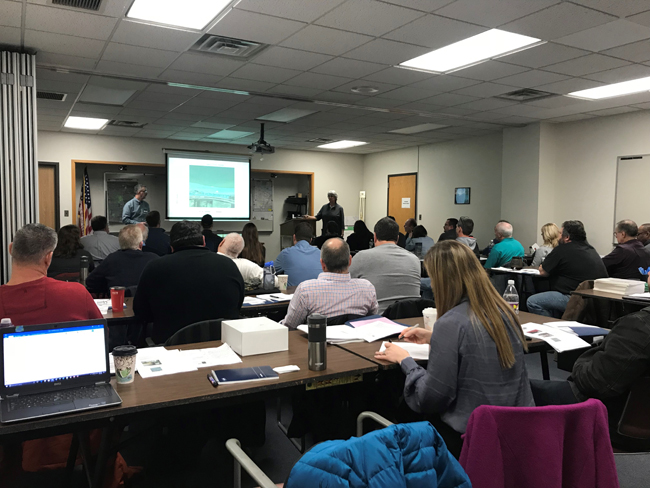NYSG-facilitated educational programming is advancing local government’s ability to address hazard resiliency
Contact:
Mary Austerman, Great Lakes Coastal Community Specialist, P: 315-331-8415, E: mp357@cornell.edu
Newark, NY, March 4, 2019 - As the global average temperature rises, communities are experiencing the impacts of climate change in localized weather pattern shifts, including more days with temperatures above 90°F, extreme precipitation, and severe storms that threaten the resiliency of New York communities.
In many cases, municipalities lack the technical expertise and/or capacity to identify and use applicable tools and resources to improve their resiliency to the impacts of climate change.
Building from previous work, New York Sea Grant (NYSG) and partners provided code enforcement officers, floodplain managers, and municipal staff and boards with training on general community resilience, floodplain management, and green infrastructure best practices.
Workshop sessions included the opportunity to consider the “State of the Shoreline,” learn about the National Flood Insurance Program and about Federal Emergency Management Agency elevation certificates, develop a post-disaster floodplain administrator response, and delve into the Rochester and Monroe County Green Infrastructure Retrofit Manual.
Based on evaluations from training events in Greece and Batavia in 2018 with a combined 110 participants, NYSG is developing similar training events for 2019.
As a result of this NYSG-facilitated educational programming, resilient communities will be better able to sustain vital services, healthy ecosystems and economic vitality, making them less susceptible to future hazardous events and more attractive to businesses and residents alike.
“This is an important and timely topic and you all did a great job of bringing it together in an informative, yet digestible format!” — Rebuilding After the 2017 Lake Ontario Flood: A Primer for Code Enforcement Officers’ workshop participant survey comment

Municipal staff at a flood resilience training developed by NYSG. Credit: NYSG/Mary Austerman.
Partners:
• New York State Department of Environmental Conservation
• New York State Stormwater and Floodplain Managers Association
• Syracuse University Environmental Finance Center
Funding:
• National Oceanic and Atmospheric Administration Community Climate Adaptation Initiative
More Info: New York Sea Grant
New York Sea Grant (NYSG), a cooperative program of Cornell University
and the State University of New York (SUNY), is one of 33 university-based
programs under the National Oceanic and Atmospheric Administration’s
National Sea Grant College Program.
Since 1971, NYSG has represented a statewide network of integrated
research, education and extension services promoting coastal community
economic vitality, environmental sustainability and citizen awareness
and understanding about the State’s marine and Great Lakes resources.
Through NYSG’s efforts, the combined talents of university scientists
and extension specialists help develop and transfer science-based
information to many coastal user groups—businesses and industries,
federal, state and local government decision-makers and agency managers,
educators, the media and the interested public.
The program maintains Great Lakes offices at Cornell University, SUNY
Buffalo, SUNY Oswego and the Wayne County Cooperative Extension office
in Newark. In the State's marine waters, NYSG has offices at Stony Brook
University in Long Island, Brooklyn College and Cornell Cooperative
Extension in NYC and Kingston in the Hudson Valley.
For updates on Sea Grant activities: www.nyseagrant.org has RSS, Facebook, Twitter, and YouTube links. NYSG offers a free e-list sign up via www.nyseagrant.org/nycoastlines for its flagship publication, NY Coastlines/Currents, which is published quarterly. Our program also produces an occasional e-newsletter,"NOAA Sea Grant's Social Media Review," via its blog, www.nyseagrant.org/blog.